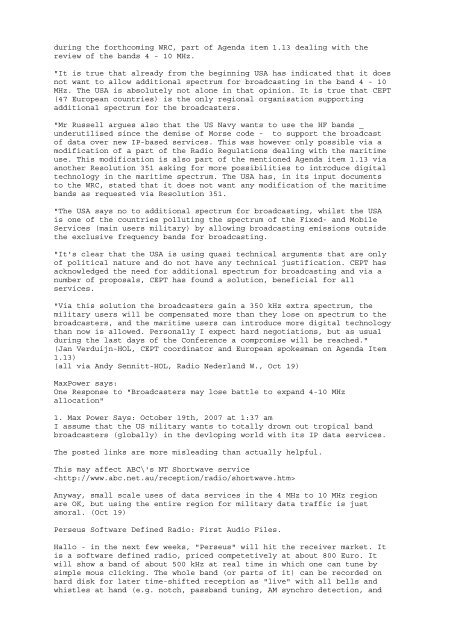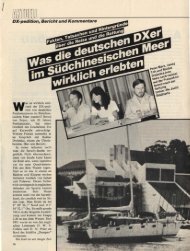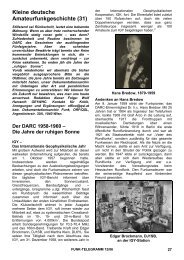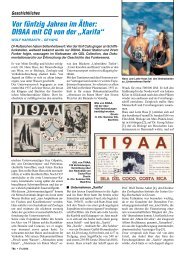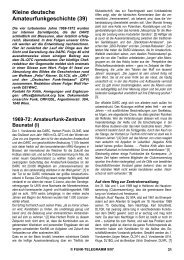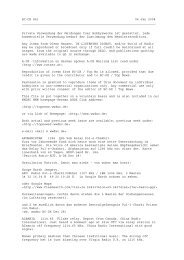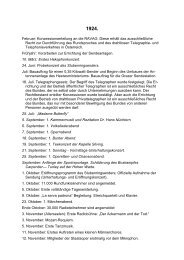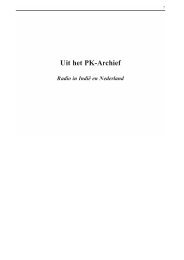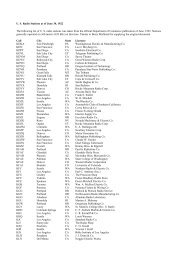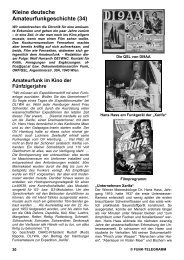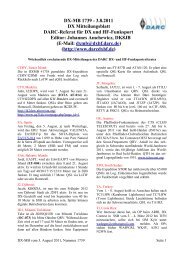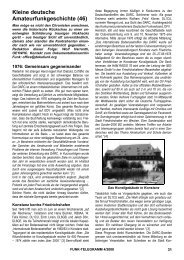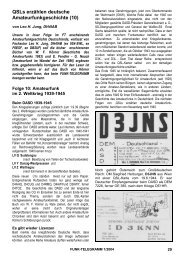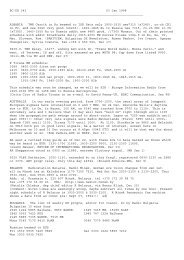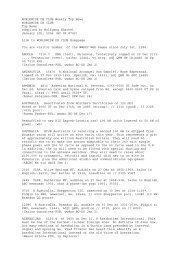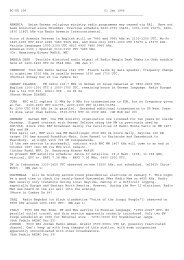- Page 1 and 2:
BC-DX 789 05 Jan 2007 _____________
- Page 3 and 4:
BOLIVIA R. Pio Doce, Siglo Veinte,
- Page 5 and 6:
submachine gun fire could be heard.
- Page 7 and 8:
complete collections from recent ye
- Page 9 and 10:
693 Voice of Russia Orianeburg, the
- Page 11 and 12:
4777 Radio Gabon, *0456-0545 Dec 31
- Page 13 and 14:
6075 was again a distaser this morn
- Page 15 and 16:
(Klaus Schneider-D, A-DX Jan 4) Her
- Page 17 and 18:
operation of 990, banned from furth
- Page 19 and 20:
GREENLAND 3815U Groenlands Radio, v
- Page 21 and 22:
KOREA D.P.R. 9335 Voice of Korea on
- Page 23 and 24:
Expansion continues with facilities
- Page 25 and 26:
The External Service of Polish Radi
- Page 27 and 28:
(Ron Howard-USA, DXplorer Jan 2) Ho
- Page 29 and 30:
12030 0200-0500 250 13665 0200-0600
- Page 31 and 32:
oken audio, but apparently with les
- Page 33 and 34:
LIT Litomysl, Czech Rep. 100 kW for
- Page 35 and 36:
so I guess it's available during li
- Page 37 and 38:
BC-DX 790 12 Jan 2007 _____________
- Page 39 and 40:
opening in several languages and s/
- Page 41 and 42:
BRAZIL 3225 R. Educadora 6 de Agost
- Page 43 and 44:
marathon, newscast; 55444. 11925 R.
- Page 45 and 46:
1100-1115 Sat 15430 KNX 100 kW / 30
- Page 47 and 48:
23h00 (temps universel) et des gran
- Page 49 and 50:
Radio Reveil Paroles de Vie: 1830-1
- Page 51 and 52:
NDR/former SFB Dannenberg 630 kHz M
- Page 53 and 54:
the 49-m-European-Shortwave-Band, 5
- Page 55 and 56:
0200-0228 NF 5980 JBR 250 kW / 306
- Page 57 and 58:
from the end of 2007. This would me
- Page 59 and 60:
they registered 236 (now 234) with
- Page 61 and 62:
5995 R. Mali, Kati, 2223-2241, 31 D
- Page 63 and 64:
4835.47 I also hrd R. Maranon on Ja
- Page 65 and 66:
(R BULGARIA DX MIX News, Ivo Ivanov
- Page 67 and 68:
Corporation along with Minister Ran
- Page 69 and 70:
largely a formality since his pendi
- Page 71 and 72:
BC-DX 791 19 Jan 2007 _____________
- Page 73 and 74:
4825 R. Educadora, Braganca PA, 085
- Page 75 and 76:
(Glenn Hauser-OK-USA, dxld Jan 16)
- Page 77 and 78:
Wolfram still co-hosts the monthly
- Page 79 and 80:
More Britz pictures, also of the M
- Page 81 and 82:
But same tx type put also on air vi
- Page 83 and 84:
Did you hear ERA 5 on 17525 at this
- Page 85 and 86:
from Thales arrived on Jan 09. Inst
- Page 87 and 88:
is also found at (Takahito Akabaya
- Page 89 and 90:
NIGERIA 4770 R. Nigeria, Kaduna, at
- Page 91 and 92:
SINGAPORE/UAE BBC Extends Bengali S
- Page 93 and 94:
9525 1430 1500 28S CAK 250 295 Bosn
- Page 95 and 96:
(WWRB via Glenn Hauser-OK-USA, dxld
- Page 97 and 98:
comments and information about the
- Page 99 and 100:
BC-DX 792 28 Jan 2007 _____________
- Page 101 and 102:
Elise", followed by usual relay of
- Page 103 and 104:
English". The report also said that
- Page 105 and 106:
for dxld Jan 21) 5066.4 R Tele Cand
- Page 107 and 108:
(Mike Barraclough-UK, direct Jan 2
- Page 109 and 110:
around 1457 with tuner melody. Freq
- Page 111 and 112:
5850 1930-2015 37,38 250 150 1 2910
- Page 113 and 114:
9490 1800-1959 46,47 125 180 123456
- Page 115 and 116:
HRT Hrvratska Radio Televizija IBB
- Page 117 and 118:
Is the old Goa-A site still in serv
- Page 119 and 120:
The radio is carried on the sound c
- Page 121 and 122:
followed, giving the freqs of 860 a
- Page 123 and 124:
Run by opponents of Belarus Preside
- Page 125 and 126:
including Tamil. Family Radio start
- Page 127 and 128:
1500-1700 UT, 11715 kHz 1700-2300 U
- Page 129 and 130:
If I understand it correct they ha
- Page 131 and 132:
50 30 47.72 N 30 46 32.6 E and in t
- Page 133 and 134:
Radio France International 0630-065
- Page 135 and 136:
tone at 1826 UT. (Frodge-MI-USA, dx
- Page 137 and 138:
Regierung werden", so Roshan in der
- Page 139 and 140:
06 25 33.32 N 02 20 42.28 E and a T
- Page 141 and 142:
Re IBB signal towards Somalia. I gu
- Page 143 and 144:
1330-1430 13600 WER 250 kW / 090 de
- Page 145 and 146:
1700-1800 11835 JUL 100 kW / 160 de
- Page 147 and 148:
& Satellite Broadcasting held here
- Page 149 and 150:
ICV: Tavolara, (Isola di Tavolara),
- Page 151 and 152:
listed //s 4895 & 4830 kHz, althoug
- Page 153 and 154:
SLOVAK REP Radio Regina Kosice best
- Page 155 and 156:
(wb, wwdxc BC-DX Feb 1) U.K. 12000
- Page 157 and 158:
The file contains 13 pages and is l
- Page 159 and 160:
BENIN 5025 R Parakou, on Feb 5 up t
- Page 161 and 162:
Administrative Conference that was
- Page 163 and 164:
CYPRUS re: 6149.96 UNID 0540 UT. Am
- Page 165 and 166:
fuer einen Empfang auch reichlich s
- Page 167 and 168:
Stunden. Bei 6130 und 7275 aus Woof
- Page 169 and 170:
2000-2015 9565 WER 250 kW / 120 deg
- Page 171 and 172:
ERA 5 - soooo, I missed something o
- Page 173 and 174:
1100-1200 9420AVL [and sometimes al
- Page 175 and 176:
school, IIRC. Eidar (207 kHz) is a
- Page 177 and 178:
(Giampiero Bernardini-I, dxld Feb 2
- Page 179 and 180:
NORTH MARIANA ISLS SAIPAN 11650 KFB
- Page 181 and 182:
Took a MP3 recording using TotalRec
- Page 183 and 184:
will be hosted by the HCJB Global T
- Page 185 and 186:
BC-DX 795 18 Feb 2007 _____________
- Page 187 and 188:
of single towers for other MW frequ
- Page 189 and 190:
Report to ERF Wetzlar on ERF-TWR br
- Page 191 and 192:
The following message just received
- Page 193 and 194:
certain Korean mint stamps, and fin
- Page 195 and 196:
Brasil 0000-0300 on 11655 LIS 300 k
- Page 197 and 198:
(via Kai Ludwig-D, dxld Feb 12) Goo
- Page 199 and 200:
The US Navy has a CDAA antenna at I
- Page 201 and 202:
his late DX-Programme in English on
- Page 203 and 204:
espanol, de lunes a viernes para to
- Page 205 and 206:
1330-1400 7275 FLE 040 kW 123 deg t
- Page 207 and 208:
a series of interviews with and sta
- Page 209 and 210:
CHINA/TAIWAN The CNR-1 broadcasting
- Page 211 and 212:
TRANSPARENCE switch to about 40% ph
- Page 213 and 214:
In fact the origin of this site goe
- Page 215 and 216:
1415 UT. (Kouji Hashimoto-JPN, JPNp
- Page 217 and 218:
(Carlos Goncalves-POR, wwdxc BC-DX
- Page 219 and 220:
SOUTH AFRICA 3320 SAUK/R. Sonder Gr
- Page 221 and 222:
page to #15 click Military History
- Page 223 and 224:
transmitter was around 38 dB, which
- Page 225 and 226:
directional antenna, 50 ohms, VSWRm
- Page 227 and 228:
ich bekam die "Betriebsbedingte Kue
- Page 229 and 230:
BC-DX 797 05 Mar 2007 _____________
- Page 231 and 232:
after the war and was based in Cari
- Page 233 and 234:
The station broadcasts in Arabic to
- Page 235 and 236:
URL: oder HINTERGRUND POLITIK -
- Page 237 and 238:
Welle hervorheben. Otto haelt - neb
- Page 239 and 240:
VOINS with strong signal in Sp on 1
- Page 241 and 242:
"For us it is a test though. We hav
- Page 243 and 244:
RNW DRM mode transmissions in A07 5
- Page 245 and 246:
Derived from the merging of All Eth
- Page 247 and 248:
etween 1000 and 1200 UT (exact time
- Page 249 and 250:
New Time Signal station Athorn test
- Page 251 and 252:
Via Anguilla: 6090 at 2230+ strong
- Page 253 and 254:
language" drop-down under Pashto -
- Page 255 and 256:
BC-DX 798 12 Mar 2007 _____________
- Page 257 and 258:
Ich frage mich nur, mit welcher Lei
- Page 259 and 260:
In a quick e-mail reply from ICDI D
- Page 261 and 262:
UAE 1539 DHABIYA at 54 25 E 24 13 N
- Page 263 and 264:
We began transmission February 25,
- Page 265 and 266:
4790.0, RRI Fak-Fak, 2021-2120, Feb
- Page 267 and 268:
de Goya(Niigata) Mar. 3 0806 UT (d
- Page 269 and 270:
RNZI A-07 [northern summer] season.
- Page 271 and 272:
of the management board of Cable &
- Page 273 and 274:
El proximo dia 25 de Marzo 2007 cam
- Page 275 and 276:
* DESDE EL CENTRO EMISOR DE CARIARI
- Page 277 and 278:
The 20th annual Shortwave Listeners
- Page 279 and 280:
fields. Antenna Code and Antenna De
- Page 281 and 282:
(Carlos Goncalves-POR, wwdxc BC-DX
- Page 283 and 284:
1600 opening, and again the broadca
- Page 285 and 286:
09635 1100-1145 49 100 1 7 Vietname
- Page 287 and 288:
2300-0000 Su 9665 12030 kHz hungari
- Page 289 and 290:
MADAGASCAR [to ZIMBABWE] Voice of t
- Page 291 and 292:
(Tarek Zeidan-EGY SU1TZ, dxld Mar 1
- Page 293 and 294:
1325, give or take a bit, per spot
- Page 295 and 296:
wrote: Hi Bjoern, - or is it VoRuss
- Page 297 and 298:
definitely not English. Long carrie
- Page 299 and 300:
frequencies. Transmission schedules
- Page 301 and 302:
SDA 1200 1300 Mandarin NE-China 967
- Page 303 and 304:
(Glenn Hauser-OK-USA, dxld Mar 11)
- Page 305 and 306:
BC-DX 800 25 Mar 2007 _____________
- Page 307 and 308:
Denge Mezopotamya 0200-0400 7590 AM
- Page 309 and 310:
1845-1900 Sat 5900 9400 2345-2400 S
- Page 311 and 312:
5865 kHz was clipping on Mar 19th,
- Page 313 and 314:
(Felix Lechte-D, A-DX Mar 20) 11784
- Page 315 and 316:
1700-1800 Italian 6140 11970 1910-1
- Page 317 and 318:
2030-2100 6045 kHz 100 kW call JSR
- Page 319 and 320:
and UTE RTTY 17694.52. Whistle carr
- Page 321 and 322:
1059-1258 on 7145 RAN 050 kW / 325
- Page 323 and 324:
Sat+Sun 1200-2000 15560 300 300 200
- Page 325 and 326:
UAE [Dubai] Google Earth and Maps L
- Page 327 and 328:
1400-1415 smtwtfs 9500Nvs 1415-1445
- Page 329 and 330:
VOVTN via Skelton 9430 1930-2030 27
- Page 331 and 332:
Und dann die Sensation: Oster-Samst
- Page 333 and 334:
BC-DX 801 31 Mar 2007 _____________
- Page 335 and 336:
7465 1931-2000 28 0 0 925 234567 25
- Page 337 and 338:
that the former Radio Monte Carlo -
- Page 339 and 340:
Apsua Radio from Abkhazia: Checked
- Page 341 and 342:
Music (ex Italian) 1630-1658 Daily
- Page 343 and 344:
then. Hope for high SSN and good pr
- Page 345 and 346:
25. (Anker Petersen-DEN, dswci Mar
- Page 347 and 348:
Briech, 2200-2400 UT, 250 kW at 27
- Page 349 and 350:
kHz. 0600-1145 (Fri only 0400-0820
- Page 351 and 352:
Scheduled via Taiwan 7390 kHz at 15
- Page 353 and 354:
two," said Fiona Auty of the Nation
- Page 355 and 356:
(Jim Moats-USA, dxld Mar 30) North
- Page 357 and 358:
11570 PAK totally distorted audio a
- Page 359 and 360:
PNG, PAC, EQA, COL, BON, Azores ? 9
- Page 361 and 362:
typical singer group, surprisingly
- Page 363 and 364:
Ibiquity quality on FM is far bette
- Page 365 and 366:
BC-DX 802 07 Apr 2007 _____________
- Page 367 and 368:
1394.82 Trans World Radio, Fllake,
- Page 369 and 370:
that a QSL was on it's way. Reply i
- Page 371 and 372:
9565 R. Tupi, Curitiba PR, 1003-112
- Page 373 and 374:
6109.76, CVI Santiago, in Portugues
- Page 375 and 376:
36 39 24.05 N 101 34 29.59 E 7125 X
- Page 377 and 378:
Also heard 29 March at 0400 UT by F
- Page 379 and 380:
Adieu Africa. (1) Comme toutes les
- Page 381 and 382:
(Carlos Goncalves-POR, wwdxc BC-DX
- Page 383 and 384:
KYRGYZ REP. UNID 4050 kHz RUS?, UKR
- Page 385 and 386:
1800-2200 UTC 702 kHz (Monte Carlo)
- Page 387 and 388:
ROMANIA RRI Bucharest broadcast som
- Page 389 and 390:
Registrant City:Susung District Reg
- Page 391 and 392:
1008 kHz: 24 03 59 N 120 25 19E Cha
- Page 393 and 394:
(via dxld Mar 31) Radio Ukraine Int
- Page 395 and 396:
(Ben Dawson, Tokyo-JPN, 1740 local
- Page 397 and 398:
(later) Mike Barraclough wrote: Int
- Page 399 and 400:
9460 SHI 100 kW / 310 deg to NoAm E
- Page 401 and 402:
English to South Asia 0400-0700 on
- Page 403 and 404:
BRAZIL 9645 R. Bandeirantes 2056 UT
- Page 405 and 406:
are scheduled from 1400-1430 on 175
- Page 407 and 408:
7175 Voice of the Broad Masses of E
- Page 409 and 410:
ancr after every 1 or 2 songs; into
- Page 411 and 412:
Hi dear Tarek, came across of a ver
- Page 413 and 414:
I think Pori may be on a different
- Page 415 and 416:
address, something with "...delina.
- Page 417 and 418:
1730-1758 6100 BIJ 250 kW ND Italia
- Page 419 and 420:
Note: 11905 & 15745 is back again!
- Page 421 and 422:
(Jos‚ Miguel Romero-ESP, hcdx Apr
- Page 423 and 424:
hat jedenfalls kein Arabisch gehoer
- Page 425 and 426:
goes for FEBC and the domestic stat
- Page 427 and 428:
SW Antenna 1: 19 31 17 S 29 56 16.6
- Page 429 and 430:
1600-1630 on 1431 DOR 600 kW / ???
- Page 431 and 432:
(Brian Alexander-PA-USA, dxld Apr 2
- Page 433 and 434:
example of active reserve: If one t
- Page 435 and 436:
(Glenn Hauser-OK-USA, dxld Apr 18)
- Page 437 and 438:
Kind regards, Radio RWE team (via A
- Page 439 and 440:
(also (9+10dB) and similar on 11835
- Page 441 and 442:
accent of ppl. from Morroco :) , th
- Page 443 and 444:
0800, mentioning slogan "La Voz de
- Page 445 and 446:
Google Earth imagery of BBC London
- Page 447 and 448:
12035 S=5, like RMP characteristics
- Page 449 and 450:
Riederwald. zu erreichen: A 661 Bad
- Page 451 and 452:
kW FM station at mutually agreed up
- Page 453 and 454:
Suddenly at 2019 some adjacent QRM
- Page 455 and 456:
NZ location. (Chris Mackerell-NZL,
- Page 457 and 458:
China also transmits on 7.335 MHz.
- Page 459 and 460:
Your program AND the Hainan Music J
- Page 461 and 462:
transmissions. We request that thes
- Page 463 and 464:
1800. (Wendel Craighead-KA-USA, DXp
- Page 465 and 466:
3995.04 RRI Kendari 1248-1319 Apr 2
- Page 467 and 468:
The IBB's Kuwait Transmitting Stati
- Page 469 and 470:
MRC Tanger Beni Makada 35 45 20.00
- Page 471 and 472:
stickers in 16 weeks, v/s Ellen Ram
- Page 473 and 474:
9840 Sudan R. Service via Moskva Ap
- Page 475 and 476:
(Later) They really are going throu
- Page 477 and 478:
12035, SW Radio Africa, about 1715
- Page 479 and 480:
powerful station so couldn't check
- Page 481 and 482:
ut not at Bimbo, as given in WRTH 2
- Page 483 and 484:
5990 1300-1700 27S 270 WER 90 BCE D
- Page 485 and 486:
11780 1730-1759 37,38W 200 JUL 100
- Page 487 and 488:
DVB Democratic Voice of Burma EMG E
- Page 489 and 490:
Albanian 0630-0730 15235 13810 1830
- Page 491 and 492:
a total time now of 15 and a half m
- Page 493 and 494:
NORWAY Updated schedule for BBC in
- Page 495 and 496:
GERMAN 0600-0626 7125 9740 1100-115
- Page 497 and 498:
(Vashek Korinek-AFS, DXplorer May 2
- Page 499 and 500:
(wb, May 2) It seems that despite t
- Page 501 and 502:
26 minutes of test time is outside
- Page 503 and 504:
Clearly the jamming is very effecti
- Page 505 and 506:
Expected Attendance: 50-100 More in
- Page 507 and 508:
0757 drums, sign-off announcement b
- Page 509 and 510:
and 1330 UT. N o t h i n g of AIR h
- Page 511 and 512:
prevu d'avoir un programme local su
- Page 513 and 514:
speaks about ten transmitters. Appa
- Page 515 and 516:
dxld May 6) KBS Social Education Se
- Page 517 and 518:
Do the times change (if yes, does t
- Page 519 and 520:
Martin Elbe: "Der war gut! Sendunge
- Page 521 and 522:
darkest days of the second world wa
- Page 523 and 524:
drumming IS, "This is CTN", into ne
- Page 525 and 526:
Hello Anker, Been inactive in dxing
- Page 527 and 528:
12. Radio Angulo Digital Sitio del
- Page 529 and 530:
via MCO-tx. I heard French, English
- Page 531 and 532:
IRAN IRIB replaced Sirjan 9905 by 9
- Page 533 and 534:
with S=9+40dB ! (wb, May 14) Yes, S
- Page 535 and 536:
15325 at 0500-0600 UT too ??? (wb)
- Page 537:
ZIMBABWE 3396 ZBC, Guineafowl, at 2
- Page 540 and 541:
Die QSL sind abgebildet auf der Web
- Page 542 and 543:
the carriers of these stations are
- Page 544 and 545:
same frequency and strong splatter.
- Page 546 and 547:
GREECE BBG's budget request for fis
- Page 548 and 549:
ased in South Korea or the United S
- Page 550 and 551:
SAINT HELENA 11092.5 usb, "Radio Sa
- Page 552 and 553:
Re Unidentified distorted station.
- Page 554 and 555:
0330-0400 9845 SKN 300kW 070deg RUS
- Page 556 and 557:
Open Radio for North Korea 1400-150
- Page 558 and 559:
BC-DX 810 01 June 2007 ____________
- Page 560 and 561:
f/ball match report; 45232. 4915 R.
- Page 562 and 563:
7105 R.FREE ASIA 2100-2200 1234567
- Page 564 and 565:
11925 VOICE OF AMERICA 0000-0300 12
- Page 566 and 567:
- Prvi izvozni posao ostvaren je 19
- Page 568 and 569:
photos at Sendeplan von CV
- Page 570 and 571:
9445 1600-1700 29,30 223 60 208 WER
- Page 572 and 573:
15255 0400-0500 40 120 105 217 WER
- Page 574 and 575:
komplett einstellen. Wie aus zuverl
- Page 576 and 577:
Japanese 1230-1345 Chinese 1345-173
- Page 578 and 579:
eceive unID station on same frequen
- Page 580 and 581:
7180 0100-0200 500 BBC 7270 1730-19
- Page 582 and 583:
17525 0300-0700 500 RFA Yangiyul /
- Page 584 and 585:
7330 1500-1900 160 11830 1400-1700
- Page 586 and 587:
away. Was putting out similar spurs
- Page 588 and 589:
VATICAN STATE 50 YEARS OF SANTA MAR
- Page 590 and 591:
The signal strengths of all frequen
- Page 592 and 593:
BC-DX 811 10 June 2007 ____________
- Page 594 and 595:
Wulumqi, Xinjiang (PRC) Russian-aim
- Page 596 and 597:
Opening announce, News. (Kouji Hash
- Page 598 and 599:
in listed Hausa. Local tribal music
- Page 600 and 601:
SERBIA On 25 May from 1800 UTC aski
- Page 602 and 603:
U.K. Google Earth imagery. LW Droit
- Page 604 and 605:
oadcasts in Russian at any moment.
- Page 606 and 607:
Greater Tindouf village near 27 40
- Page 608 and 609:
54433, adjt. QRM only; check 5035.
- Page 610 and 611:
Checked this distorted audio statio
- Page 612 and 613:
songs in English and Spanish. (Jame
- Page 614 and 615:
(Bernd Trutenau-LTU, DXplorer June
- Page 616 and 617:
PHILIPPINES 9581.95 Radio ng Bayan,
- Page 618 and 619:
(Patrick Robic-AUT, A-DX June 15) R
- Page 620 and 621:
SUI SW Lenk 250 kW, I guess, approx
- Page 622 and 623:
RTI 9735 kHz not additional, test o
- Page 624 and 625:
Galeria zahlen. Bei der roemischen
- Page 626 and 627:
BC-DX 813 24 June 2007 ____________
- Page 628 and 629:
1530-1630 on 11520 IRA 250 kW / 299
- Page 630 and 631:
ut tough copy under the Chinese. (G
- Page 632 and 633:
1605-1625 Russian 9705 11885 2000-2
- Page 634 and 635:
Cook Isl 35deg 1851-2050 9615 AM 50
- Page 636 and 637:
mast distance 91.5 m; row distance
- Page 638 and 639:
BC-DX 814 30 June 2007 ____________
- Page 640 and 641:
6010 R. Bahrain Jun 15 1755-1825 34
- Page 642 and 643:
causing multiple hets against 7290
- Page 644 and 645:
(Kai Ludwig-D, dxld June 28) DIG Di
- Page 646 and 647:
Re. Hungarians living abroad: How m
- Page 648 and 649:
of this came at 0257. Annc mentione
- Page 650 and 651:
LUXEMBOURG 6095 DRM schedule effect
- Page 652 and 653:
(Victor Rutkovsky, ibid.) And I fin
- Page 654 and 655:
The CRI and CNR outlets are everywh
- Page 656 and 657:
Ein kleiner Rundgang in Bildern bef
- Page 658 and 659:
BC-DX 815 07 July 2007 ____________
- Page 660 and 661:
BHUTAN 6035 Early June I travelled
- Page 662 and 663:
1230-1257 6055 7345 1530-1557 5930
- Page 664 and 665:
Radio Fana can be heard in many dis
- Page 666 and 667:
(Google Earth imagery) Shortwave 48
- Page 668 and 669:
2200-2300 9665 JBR 250 kW 245 deg t
- Page 670 and 671:
The Independent, 13 April 2000. See
- Page 672 and 673:
n = number of parallel rows spaced
- Page 674 and 675:
(second item on this page). Very em
- Page 676 and 677:
aus mehr als zwei Leuten: Denis Her
- Page 678 and 679:
As a former staff member of the Eng
- Page 680 and 681:
More Libyan Arabic heard on 15550 k
- Page 682 and 683:
NETHERLANDS David de Jong reports:
- Page 684 and 685:
(Kouji Hashimoto-JPN, JPNpremium Ju
- Page 686 and 687:
0256 UT, then Radio Bulgaria IS at
- Page 688 and 689:
showing one-hour-earlier shift at m
- Page 690 and 691:
misunderstanding. DRM signal really
- Page 692 and 693:
do not matter" concept, with the 19
- Page 694 and 695:
a. Heinenoord 828 kHz b. Markerwaar
- Page 696 and 697:
(Rumen Pankov-BUL, wwdxc BC-DX July
- Page 698 and 699:
elay partners), and I thought this
- Page 700 and 701:
?? 06 48 26.33 S 39 12 40.73 E or ?
- Page 702 and 703:
1600-1700 on 13620 WER 500 kW / 120
- Page 704 and 705:
longer than that, either. Had a min
- Page 706 and 707:
adio station in 2000 setting the po
- Page 708 and 709:
BC-DX 817 22 July 2007 ____________
- Page 710 and 711:
Have in mind that he will be on lea
- Page 712 and 713:
See also Re. Ismaning (BR site): P
- Page 714 and 715:
1800-1830 6140 WER 100 kW / 075 deg
- Page 716 and 717:
music, R.R.I. ID. During the past w
- Page 718 and 719:
fast die einzigen Sendungen sind, d
- Page 720 and 721:
case even earlier when Radio Maryja
- Page 722 and 723:
DXLD 7-082, "gives a revised tentat
- Page 724 and 725:
the Broadcasting Board of Governors
- Page 726 and 727:
2654 - Minsk utility station (USB)
- Page 728 and 729:
[aber Palestina und Gaza strip nich
- Page 730 and 731:
15344.19 ID of RAE Buenao Aires in
- Page 732 and 733:
Eisenach 96,5 MHz Bei mir hier in S
- Page 734 and 735:
0030-0100 9620 WER 500 kW / 090 deg
- Page 736 and 737:
BTW, according to Aoki listings, th
- Page 738 and 739:
shows only these broadcasts from Su
- Page 740 and 741:
(John Wilkins-CO-USA, DXplorer July
- Page 742 and 743:
Radio via Wertachtal (in fact it wa
- Page 744 and 745:
UK transmitter maps. BBC, commercia
- Page 746 and 747:
shortwave broadcast season. The Ame
- Page 748 and 749:
neighboring countries to get their
- Page 750 and 751:
BC-DX 819 07 Aug 2007 _____________
- Page 752 and 753:
AUSTRALIA A few obs. on R. Australi
- Page 754 and 755:
Voz do Brasil part 1; 43542, adjt.
- Page 756 and 757:
over a year now. But I think it has
- Page 758 and 759:
These ones are probably well-known
- Page 760 and 761:
(illustrated) (Kai Ludwig-D, wwdxc
- Page 762 and 763:
However, on Aug. 2 I tried the 1830
- Page 764 and 765:
PAKISTAN Google Earth imagery. Sear
- Page 766 and 767:
45 24 17 90 N 38 09 29 00 E KGZ RJH
- Page 768 and 769:
what next to expect 0800 UT French
- Page 770 and 771:
Four radio masts which dominated th
- Page 772 and 773:
ZIMBABWE 3396 R. Zimbabwe, 0350-042
- Page 774 and 775:
THOMSON TSW 2100D DRM short wave ra
- Page 776 and 777:
occasional song but mostly talk; no
- Page 778 and 779:
4920 RRI Biak at 1208-1245+ UT on A
- Page 780 and 781:
e the playout set-up, just as humbl
- Page 782 and 783:
Syzran GRI 8000 1150 kW Loran-C Cha
- Page 784 and 785:
(Jari Savolainen-FIN, dxld Aug 12)
- Page 786 and 787:
1520-1540 11810 15565 CHERKASSI 034
- Page 788 and 789:
2030-2100 KBS World Radio 2100-2130
- Page 790 and 791:
ALBANIA 13750 Radio Tirana English
- Page 792 and 793:
und im Laufe 1966 eingeweiht worden
- Page 794 and 795:
1030 Amharic 13:30 Saturday until 1
- Page 796 and 797:
Russian 0130-0227 17830 1500-1600 9
- Page 798 and 799:
work on the frequency of 549 kHz, t
- Page 800 and 801:
There are two EMI HFCC registration
- Page 802 and 803:
Informationen, die sie ueber Aether
- Page 804 and 805:
shows some sequences with the radio
- Page 806 and 807:
messages (tent); 33341, adjt. uty.
- Page 808 and 809:
f/ball match rpt; 54433. 6150 R. Re
- Page 810 and 811:
one presented for Chad on (Mauno R
- Page 812 and 813:
letzten Freitag im April bis zum le
- Page 814 and 815:
July 1955: TV transmitter went on a
- Page 816 and 817:
INDONESIA 3976.06 RRI Pontianak 104
- Page 818 and 819:
39 20 13.31 N 08 51 48.09 E - or wh
- Page 820 and 821:
In the case of "Furusato no Kaze",
- Page 822 and 823:
1632 RTM "B", site?, 1402-1855, 19
- Page 824 and 825:
ut antenna masts much better visibl
- Page 826 and 827:
LW 198 TRT, -- I will check it on A
- Page 828 and 829:
1200-1300 1170 6140 9645 9760 12075
- Page 830 and 831:
Searching the WHR site on VOBI turn
- Page 832 and 833:
(Andy Sennitt-HOL, dxld Sep 1) ALGE
- Page 834 and 835:
(A. Ishida-JPN, ndxc HQ via wwdxc B
- Page 836 and 837:
nicht voellig aufgegeben. 6080 CKFX
- Page 838 and 839:
the RDS PS code to display text inf
- Page 840 and 841:
Russian 2300-2400 Russia 9345 Persi
- Page 842 and 843:
I found this at : Radio DMR (6235
- Page 844 and 845:
esponse; shift to female voice at 0
- Page 846 and 847:
images... ESP RNE Oviedo 549 kHz 10
- Page 848 and 849:
TAIWAN 9485 Shiokaze 1320 Sep 1. Ob
- Page 850 and 851:
2230-2330 6060 15340 (R BULGARIA DX
- Page 852 and 853:
Radio Australia's service to Papua
- Page 854 and 855:
18&tilt=-90&dir=0&alt=464.416224460
- Page 856 and 857:
P.O.Box 510620, D-13366, Berlin (as
- Page 858 and 859:
Der Kurzwellensender 6005 kHz in Be
- Page 860 and 861:
1620, 3240, 4860, 1630, 3260 and 48
- Page 862 and 863:
Re this part of Wolfgang's mail "AM
- Page 864 and 865:
Please check the frequncies at NHK
- Page 866 and 867:
station in Wabang on 1494 kHz a cou
- Page 868 and 869:
chambers, and one of them actually
- Page 870 and 871:
1400-1500 on 5830 KHR 100 kW / 055
- Page 872 and 873:
RUS 171 / 549 Yakutsk low resolutio
- Page 874 and 875:
the expected effects that widesprea
- Page 876 and 877:
transparency of high quality audio
- Page 878 and 879:
BENIN Mr. Eric Biokou, the chief en
- Page 880 and 881:
Sep. 4845.2 R. Cultura Ondas Tropic
- Page 882 and 883:
Heard // 5030 and 6030. (Ron Howard
- Page 884 and 885:
1630-1645 on 11655 JUL 100 kW / 100
- Page 886 and 887:
Ab Fruehjahr 2008 folgt auch der Au
- Page 888 and 889:
Yes, RRI Palangkaraya and R North S
- Page 890 and 891:
2000-2115 Hebrew on 11585 and presu
- Page 892 and 893:
Discontinuation of the English serv
- Page 894 and 895:
Remaining direct via Yamata-JPN. Pl
- Page 896 and 897:
7285.5 R. Mali, Kati, 1252-1324, 10
- Page 898 and 899:
PERSIAN 1715-1800 6235.4 ARABIC 181
- Page 900 and 901:
SAINT HELENA To celebrate R. St. He
- Page 902 and 903:
ZIMBABWE 4828 Voice of Zimbabwe, Gu
- Page 904 and 905:
BC-DX 826 22 Sep 2007 _____________
- Page 906 and 907:
(wb, wwdxc BC-DX Sept 13/14) Yes, w
- Page 908 and 909:
Dokumentation von Ute Boennen und G
- Page 910 and 911:
Vividh Bharati Service 1245-1740 UT
- Page 912 and 913:
Frequency. Tune-in to lite instrume
- Page 914 and 915:
RNW A-07 DRM outlets from Sept 18th
- Page 916 and 917:
4886.6 Peru, Radio Virgen del Carme
- Page 918 and 919:
Frequency change for Voice of Russi
- Page 920 and 921:
1700-2000 / 7490 / Kharkov / 100 /
- Page 922 and 923:
1415-1500 sm..tf. URDU 9500 NVS 250
- Page 924 and 925:
u.a. Vorfuehrung der TruckBox, TV-A
- Page 926 and 927:
decision of what you actually final
- Page 928 and 929:
the transmitter project, including
- Page 930 and 931:
America from 0500 to 0700 hours UTC
- Page 932 and 933:
no interested party is willing to p
- Page 934 and 935:
mediumwave broadcasts during the ni
- Page 936 and 937:
UTC 2240-0055 Italian, 0055-0115 En
- Page 938 and 939:
(via Kai Ludwig-D, dxld Sept 22) ME
- Page 940 and 941:
my next mail. Bye. (Aslam Javaid-PA
- Page 942 and 943:
(Bernd Waniewski, Sept 25) WB: Stil
- Page 944 and 945:
2 x Thomcast revolving aerials (sma
- Page 946 and 947:
Eastern Brovary site (actually it's
- Page 948 and 949:
1030-1100 Ilocano Philippines 11930
- Page 950 and 951:
display at the gap for public viewi
- Page 952:
It was very unfortunate the past se
- Page 955 and 956:
FRENCH 1830-1900 on 7430 SHI 100 kW
- Page 957 and 958:
Bul of prgr "Horizont" on 843 kHz,
- Page 959 and 960:
mit einem Programmsignal von AFN Ba
- Page 961 and 962:
SWAHILI 17800 1500 1559 250 DHABAYY
- Page 963 and 964:
GERMAN 11865 2200 2355 250 SINES 23
- Page 965 and 966:
GERMAN 12070 1600 1759 250 WOOFFERT
- Page 967 and 968:
(Terry L. Krueger-USA, DXplorer Oct
- Page 969 and 970:
for linx, via dxld Oct 2) Radiotele
- Page 971 and 972:
(Mauno Ritola-FIN, direct Oct 4) 47
- Page 973 and 974:
English Program of Radio Pakistan N
- Page 975 and 976:
gerade dann in zur Ausstrahlung ung
- Page 977 and 978:
das deutsche Programm von Radio Mos
- Page 979 and 980:
Issoudun 500 Spanish 0200-0300 dail
- Page 981 and 982:
243 Erzurum, 2345-0003, 21 Sept, Tu
- Page 983 and 984:
Jerome Van der Linden from South Au
- Page 985 and 986:
1900-1930 on 1458 FLA 500 kW / 338
- Page 987 and 988:
Voice of Tigray Revolution has now
- Page 989 and 990:
INDONESIA 11785 Voz de Indonesia, 1
- Page 991 and 992:
Am 05.10.07 war das fade-in zwische
- Page 993 and 994:
Perhaps it should be added that "th
- Page 995 and 996:
extraordinary Ramadan programmes wi
- Page 997 and 998:
somewhat distorted modulation and a
- Page 999 and 1000:
Since Oct 4 Deutsche Welle beams a
- Page 1001 and 1002:
PERSIAN 0930-1055 11795 17690 1330-
- Page 1003 and 1004:
1930-2000 AF 9535au 2000-2030 AF 98
- Page 1005 and 1006:
ZAMBIA 5915 Radio Zambia, *0235-030
- Page 1007 and 1008:
the introduction of DRM: The Radioc
- Page 1009 and 1010:
BC-DX 830 19 Oct 2007 _____________
- Page 1011 and 1012:
carrier on 13 October but no audio,
- Page 1013 and 1014:
Sendezeit ist 07.00 bis 09.00 Uhr U
- Page 1015 and 1016:
newsletter HCJB will built a new t
- Page 1017 and 1018:
15795 kHz at 1430 UT, Oct 13. Cover
- Page 1019 and 1020:
2100-2200 6005 100kW 330deg fuer No
- Page 1021 and 1022:
are heard here) on 3912, 6348, 6003
- Page 1023 and 1024:
560 meters southerly MW directional
- Page 1025 and 1026: 1951-2358 17675 AM & 15720 DRM Vanu
- Page 1027 and 1028: ecognizable jingles from major broa
- Page 1029 and 1030: 1400 UT 15081 (15073 to 15088 kHz r
- Page 1031 and 1032: The same procedures as in 2006 for
- Page 1033 and 1034: optimistic about the future of the
- Page 1035 and 1036: BC-DX 831 26 Oct 2007 _____________
- Page 1037 and 1038: 9825 ?? UNIDed Arab station with ma
- Page 1039 and 1040: Please note that the schedules are
- Page 1041 and 1042: Studies of planes used by the CIA f
- Page 1043 and 1044: 7335 1530-1559 29N 50 212 JUL 100 P
- Page 1045 and 1046: 12005 1430-1529 41NE,43 75 218 WER
- Page 1047 and 1048: * changes + active on demand # mome
- Page 1049 and 1050: 0600-0700 12105 Albanian 0700-0800
- Page 1051 and 1052: Richard had bought the property par
- Page 1053 and 1054: 1030-1045 N. America/W. Europe 1576
- Page 1055 and 1056: (Glenn Hauser-OK-USA, dxld Oct 20)
- Page 1057 and 1058: 2359-0558 15720 AM & 17675 DRM Paci
- Page 1059 and 1060: of the East Pakistan era and want g
- Page 1061 and 1062: POLAND[non]/FRANCE-Monaco/FR GUIANA
- Page 1063 and 1064: 15660 spurs Oct 24th, 1200-1500 UT
- Page 1065 and 1066: 0415-0445 NAM (tu): 9690 1825-1855
- Page 1067 and 1068: * DESDE EL CENTRO EMISOR DE CARIARI
- Page 1069 and 1070: fr.o.m. 28 oktober Samtliga tider:
- Page 1071 and 1072: suffered by some special Somali or
- Page 1073 and 1074: shortwave broadcasting in the Ameri
- Page 1075: Sunday, but instead would move to 1
- Page 1079 and 1080: BC-DX 832 05 Nov 2007 _____________
- Page 1081 and 1082: AUSTRALIA B-07 for CVC Internationa
- Page 1083 and 1084: 9630 R. Aparecida, Aparecida SP, 21
- Page 1085 and 1086: DTK Wertachtal 1500-1800 UT. (wb) E
- Page 1087 and 1088: e received across much of Abkhazia
- Page 1089 and 1090: Mandarin 1145-1400 Daily 7485 Manda
- Page 1091 and 1092: quick Radio Republik Indonesia ID.
- Page 1093 and 1094: Yes Glenn, figured that out EASILY
- Page 1095 and 1096: NEW ZEALAND R NZi B-07 schedule. 1
- Page 1097 and 1098: *) special broadcasts only, usually
- Page 1099 and 1100: 11855 1800-1900 39,40 UDO 250 284 T
- Page 1101 and 1102: 5965 kHz scheduled 0410-1210 UT. 01
- Page 1103 and 1104: NewStar company from Chengdu, China
- Page 1105 and 1106: Quite weak on 7390 but very strong
- Page 1107 and 1108: The programme has no announcements
- Page 1109 and 1110: abgeschlossen. Beide Partner wollen
- Page 1111 and 1112: 4790 RRI Fak-Fak, BI anncts, 1209 s
- Page 1113 and 1114: Europe 0600-0655 on 7130 LIS 300 kW
- Page 1115 and 1116: living here in Central Europe. Comp
- Page 1117 and 1118: Erinnerungen. Allerdings sind heute
- Page 1119 and 1120: BC-DX 834 16 Nov 2007 _____________
- Page 1121 and 1122: (Richard Chen, Trinidad & Tobago, e
- Page 1123 and 1124: north of the site, presumably for t
- Page 1125 and 1126: But I must admit that the situation
- Page 1127 and 1128:
Tuned in 11645 kHz earlier in the h
- Page 1129 and 1130:
level on my ICF 7600GR, observed on
- Page 1131 and 1132:
Vientiane has been using 640 kHz fo
- Page 1133 and 1134:
songs, political slogans ("United w
- Page 1135 and 1136:
PASHTO 0500-0545 on 6235 URDU 0500-
- Page 1137 and 1138:
Items noted were amongst a lot of m
- Page 1139 and 1140:
Yes, maybe the super powers MW's 64
- Page 1141 and 1142:
medium wave (=963 kHz) to cover all
- Page 1143 and 1144:
0400-0600 English 0600-0700 Spanish
- Page 1145 and 1146:
VIETNAM/CHINA Voice of Vietnam repo
- Page 1147 and 1148:
"The company hopes to conclude a tr
- Page 1149 and 1150:
Last info I had was that this DX pr
- Page 1151 and 1152:
9645.2 R. Bandeirantes, Sao Paulo S
- Page 1153 and 1154:
Per my B07 Aoki detective work I ha
- Page 1155 and 1156:
jamming I didn't hear it. 11645KIG
- Page 1157 and 1158:
(wb, Nov 22) 6005 kHz Funkhaus Eusk
- Page 1159 and 1160:
And in fact activating 792 from Mal
- Page 1161 and 1162:
shores of the Axios river. 40 31 54
- Page 1163 and 1164:
their contributors from Far East ar
- Page 1165 and 1166:
and also two (RESERVE) fountain ant
- Page 1167 and 1168:
But I have not found that site!. An
- Page 1169 and 1170:
UT, poss. nx as a couple mentions o
- Page 1171 and 1172:
SERBIA New website of Radio Serbien
- Page 1173 and 1174:
3. "The 2 rhombic antennas can not
- Page 1175 and 1176:
Hope things are going OK for you, a
- Page 1177 and 1178:
distinctive card, and VLT Port More
- Page 1179 and 1180:
frequencies for use in the very ear
- Page 1181 and 1182:
Moosbrunn 17855, and DWL via Moosbr
- Page 1183 and 1184:
1730-1900 on 15155 ABZ 100 kW / 160
- Page 1185 and 1186:
fact that China increases its prese
- Page 1187 and 1188:
(R BULGARIA DX MIX News, Ivo Ivanov
- Page 1189 and 1190:
9440 1600 1629 29S 220/01 75 146 WE
- Page 1191 and 1192:
13700 1300 1600 41 214 90 217 WER 5
- Page 1193 and 1194:
today 1000-1200. Three photos are p
- Page 1195 and 1196:
9680 RRI Jakarta, at 1007-1027 UT o
- Page 1197 and 1198:
sender SWR Rohrdorf Germany. [c.f.
- Page 1199 and 1200:
Radio Bremen site in 1996. Formerly
- Page 1201 and 1202:
620 meters away from the antenna ma
- Page 1203 and 1204:
end of px annct in En and Burmese,
- Page 1205 and 1206:
carrier S=9+30dB, but tiny audio mo
- Page 1207 and 1208:
9950 Radio Free Chosun - Jayu Joseo
- Page 1209 and 1210:
Botswana. (Jim Ronda-OK-USA, DXplor
- Page 1211 and 1212:
USA More Infos on maritime costal s
- Page 1213 and 1214:
6060 RHC Sp, suffers by DRM Kuwait
- Page 1215 and 1216:
9795 Farda Lampertheim, Pe 9800 ten
- Page 1217 and 1218:
Yahoo Maps. Google Maps. ARG RAE
- Page 1219 and 1220:
(Keith Ashton, 4 posts Nov 22-23 on
- Page 1221 and 1222:
sgtronger co-ch. QRM at 1400. 11925
- Page 1223 and 1224:
UT. wb. Noticia Interesante Sobre G
- Page 1225 and 1226:
in WRTH 1964y change: ...Santa Isab
- Page 1227 and 1228:
de 52%, devenant ainsi l'actionnair
- Page 1229 and 1230:
Another one I recently got tipped o
- Page 1231 and 1232:
ITALIAN 0630-0727 7545 13620 15085
- Page 1233 and 1234:
- Page 1235 and 1236:
NIGER 9704.98 La Voix du Sahel (pre
- Page 1237 and 1238:
Re: DWL Amharic, ... and Ethiopian
- Page 1239 and 1240:
QSL-reports are kindly received: -
- Page 1241 and 1242:
over and over gain during that hour
- Page 1243 and 1244:
15380 BSKSA Riyadh Arabic, crystal
- Page 1245 and 1246:
So the "no change" folks win a pyrr
- Page 1247 and 1248:
ARM Gavar Kamo Yerevan site at 40 2
- Page 1249 and 1250:
2230-2257 on 5930 9435 2330-2357 on
- Page 1251 and 1252:
Fair signal of S=5-6 level noted to
- Page 1253 and 1254:
RTAlgiers tests in Arabic (Holy Qur
- Page 1255 and 1256:
5925 1530-1730 40E,41N KAM 500 94 U
- Page 1257 and 1258:
LITHUANIA 5815, Radio Racja, via Si
- Page 1259 and 1260:
which has PKV series transmitters,
- Page 1261 and 1262:
hectares as a permanent site in Por
- Page 1263 and 1264:
PHL FEBC Bocaue 14 48 08.60 N 120 5
- Page 1265 and 1266:
(Ron Howard-CA-USA, DXplorer Dec 8)
- Page 1267 and 1268:
says they've already started using
- Page 1269 and 1270:
1630-1657 on 5915 6055 2000-2027 on
- Page 1271 and 1272:
not specifically frequency hours. B
- Page 1273 and 1274:
Windows PC with this CD, and the "s
- Page 1275 and 1276:
Tests via Issoudun France last only
- Page 1277 and 1278:
To the left one of the four 100 kW
- Page 1279 and 1280:
Transmitters are two Telefunken S40
- Page 1281 and 1282:
2006-08-11 date origin. CHN Kashgar
- Page 1283 and 1284:
Germany due to north east direction
- Page 1285 and 1286:
7099.99 Voice of the Broad Masses o
- Page 1287 and 1288:
(de IW0HK Andrea Borgnino-I, BrDXC-
- Page 1289 and 1290:
In 2002 enthusiastic on-site engine
- Page 1291 and 1292:
during 2006 and 2007. QSLs are avai
- Page 1293 and 1294:
1500 UT (Sp) came NOT from Bijeljin
- Page 1295 and 1296:
So I guess really power is between
- Page 1297 and 1298:
towards Stuttgart. btw. when I reme
- Page 1299 and 1300:
Iranian jammers observed 1225-1455
- Page 1301 and 1302:
2000-2200 15195 ASC 250 kW 065 deg
- Page 1303 and 1304:
1800-1830 on 12015 HRA 250 kW / 090
- Page 1305 and 1306:
(Bernhard Weiskopf-D, drm-dx Dec 16
- Page 1307 and 1308:
BC-DX 840 28 Dec 2007 _____________
- Page 1309 and 1310:
CODAR QRM. 4699.4 R. San Miguel, Ri
- Page 1311 and 1312:
Campos apurou, a reativacao em 5045
- Page 1313 and 1314:
5035, Educacao Rural, Coari: quando
- Page 1315 and 1316:
CHAD 4905 (reactivated) RD. Natle.
- Page 1317 and 1318:
heard. (Brian Alexander-PA-USA, hcd
- Page 1319 and 1320:
Hintergrund schwappte immer wieder
- Page 1321 and 1322:
Dec, French, radioplay; 22341, uty.
- Page 1323 and 1324:
Some other notes: The station was t
- Page 1325 and 1326:
6130 1600-2100 250 6145 1600-2300 2
- Page 1327 and 1328:
12010 0200-0600 250 12040 0200-0600
- Page 1329 and 1330:
11655 1300-1500 200 BBC 11900 1500-
- Page 1331 and 1332:
7485 1400-1500 (Thur, Fri) 100 BVB
- Page 1333 and 1334:
2100-2200 7170 7170 Moscow 250 Euro
- Page 1335 and 1336:
2 LW masts? 153 kHz ? 50 39 25.67 N
- Page 1337 and 1338:
55 50 01.52 N 38 20 28.12 E could b
- Page 1339 and 1340:
Puzzle. Unid 11819.16 kHz noted in
- Page 1341:
Lumpur on 4-8 February 2008 to try


